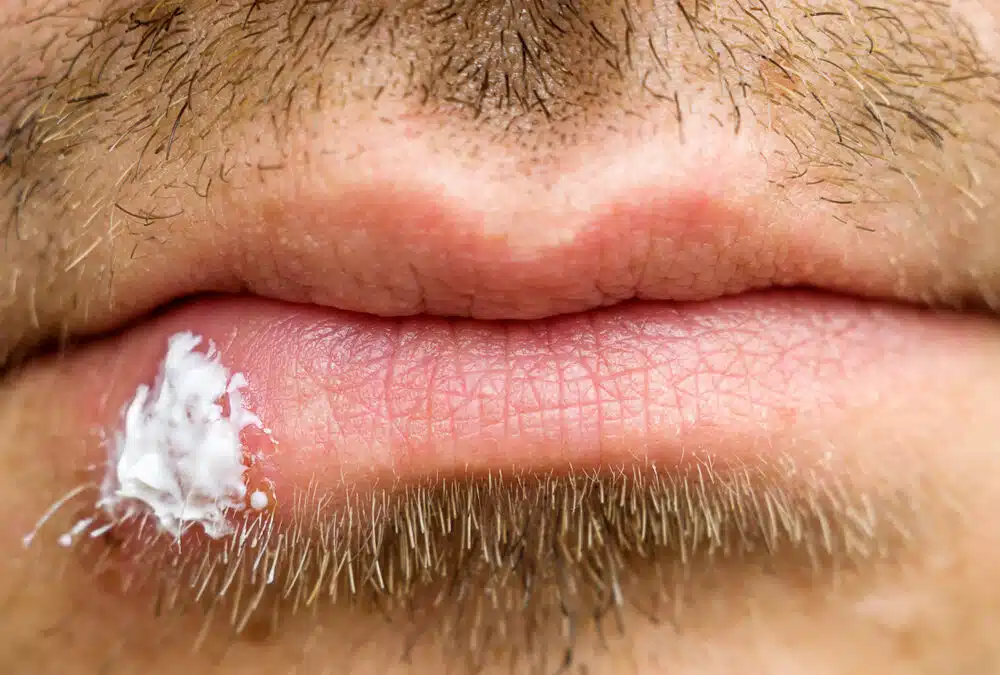A painful bump or ulcer in your mouth can be frustrating and concerning. While canker sores and cold sores are common culprits, it’s important to remember that mouth sores can have various causes. This post will shed light on the key differences between canker sores and cold sores, helping you navigate the discomfort and seek appropriate solutions.
The Difference Between Canker Sores and Cold Sores: It’s Not All Blisters and Bites
While both canker sores and cold sores bring discomfort, they have distinct characteristics:
| Feature | Canker Sore (Aphthous Ulcer) | Cold Sore (Fever Blister) |
|---|---|---|
| Location | Inside the mouth: cheeks, tongue, gums | Outside the mouth: lips, around the mouth |
| Appearance | Round, white or gray ulcer with a red border | Cluster of small, fluid-filled blisters |
| Size | Smaller (usually under 1 cm) | Larger (can grow up to 1 cm) |
| Pain | More painful, especially when touched | Tingling, burning, itching before blistering |
| Contagious | No | Yes, highly contagious through contact |
| Cause | Unknown, linked to stress, diet, injury | Herpes simplex virus (HSV-1) |
Remember: This is a general comparison. If you experience a mouth sore with unusual characteristics or prolonged healing time, consult your dentist for a diagnosis. Early diagnosis can ensure proper treatment and rule out any other potential causes.
Finding Relief: Exploring Remedies for Mouth Sore Discomfort
While the cause of canker sores remains elusive, several remedies can help manage discomfort and promote healing:
- Over-the-counter pain relievers: Options like ibuprofen or acetaminophen can help manage pain and inflammation.
- Topical ointments: Look for gels or ointments containing lidocaine for numbing or zine oxide to protect the sore.
- Mouth rinses: Use a gentle, alcohol-free mouthwash to maintain oral hygiene without irritation.
- Dietary adjustments: Avoid acidic or spicy foods that can worsen discomfort. Focus on soft, bland foods.
- Lysine: This amino acid is a popular over-the-counter option for cold sores. While research results are mixed, some studies suggest it may reduce outbreak frequency or shorten healing time.
Natural Remedies: While research is ongoing, some natural options may offer relief, but be sure to consult your dentist before using any new product:
- Honey: A natural antibacterial and anti-inflammatory agent, honey can promote healing. Apply a small amount directly to the sore (not recommended for young children).
- Licorice root: This herb possesses anti-inflammatory properties. Look for licorice root extracts in lozenges or gels (consult your dentist before using licorice root if you have high blood pressure).
- Aloe vera: The gel from this plant has soothing and healing properties. Apply a small amount to the sore.
Important Note: The effectiveness can vary with these natural remedies. Consult your dentist before using any new product, especially if you have underlying health conditions.
A Promising Option: Laser Therapy
Another area that has shown promise is with the use of a diode laser to treat the affected region of the mouth.
- Cold Sores: Diode laser therapy, particularly during the prodromal stage (tingling, itching before blisters appear), can potentially prevent a cold sore from fully erupting. Additionally, some patients report a reduced frequency of outbreaks with repeated laser treatments.
- Canker Sores: Many patients have reported almost immediate relief from painful canker sores after in-office treatment with a diode laser.
Laser therapy offers several potential benefits:
- Reduced healing time: Laser light may accelerate tissue regeneration, promoting faster healing.
- Pain relief: Laser therapy can alleviate discomfort associated with both canker sores and cold sores.
- Reduced risk of infection: Lasers may have a disinfecting effect, minimizing the risk of secondary infections.
Disclaimer: It’s important to note that laser therapy is not a one-size-fits-all solution, and further research is needed to solidify its effectiveness for canker sores
When in Doubt, Consult Your Dentist
While this post provides a general overview, a definitive diagnosis is crucial for proper treatment. Your dentist can examine the sore, determine its cause (canker sore, cold sore, or something else), and recommend the most effective course of action.
By understanding the differences between canker sores and cold sores, exploring potential remedies, and prioritizing a dentist’s diagnosis, you can navigate mouth sore discomfort with more clarity and confidence. Remember, early diagnosis and proper care are key to a speedy recovery and a more comfortable smile.




